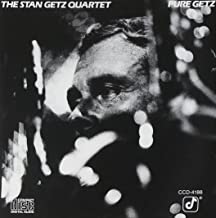
Requisites
Pure Getz ~ The Stan Getz Quartet | By Eddie Carter
I enjoy listening to jazz when I’m reading and one of my favorite musicians to hear is Stan Getz. He became a favorite of mine after hearing The Girl From Ipanema and Corcovado from the 1964 album, Getz/Gilberto. I also got to see him perform live as a member of the 1972 Newport Jazz Festival All-Stars at Music Hall on July 6, 1972, in New York City. This morning’s choice from the library is Pure Getz (Concord Jazz CJ-188) featuring his quartet at the time, Jim McNeely on piano; Marc Johnson on bass; Billy Hart (tracks: A3, B1, B2) and Victor Lewis (tracks: A1, A2, A4, B3) on drums. My copy used in this report is the 1982 US Stereo release.
The album opens with an uptempo tune by Jim McNeely, On The Up and Up. The ensemble starts with an invigorating melody, then Stan moves right into a sizzling lead statement. Jim swings hard on the next solo with a bouncy effervescence and spirited lyricism. Marc responds with an impressive presentation that appeals at every turn, and Victor keeps the rock-solid beat flowing into a quick climax.
The pace slows down for Blood Count by Billy Strayhorn, originally written as a three-part work for Duke Ellington titled Blue Cloud. It was Strayhorn’s final composition for Duke before succumbing to cancer on May 31, 1967. Ellington himself only performed the tune twice after Billy’s passing. First at a Carnegie Hall concert later that year in August and on his touching 1968 tribute album in memory of Strayhorn, And His Mother Called Him Bill. The quartet delivers an evocatively moving melody and Getz blows a passionately delicate performance culminating with a compassionate coda.
Very Early by Bill Evans is a pretty tune written early in the pianist’s career that was featured on his 1962 album, Moon Beams. The quartet presents this song at an easy, relaxing tempo with Billy Hart on drums. Marc opens with a tenderly expressive solo, then Jim turns in an enchanting interpretation next. Stan weaves a gentle spell of tenderness on the closing statement with a wonderful warmth and presence.
Sipping at Bell’s by Miles Davis begins with a three-instrument chat between Getz, Johnson, and Lewis. McNeely joins the discussion for the informal melody, then Johnson carves out a clever opening reading. Getz is formidable on the next presentation with a sharp, crisp attack. McNeely permits his fingers full sway on an effectively swift performance, and Lewis connects with a lightness of touch on a brief statement that’s exceptionally smooth.
Side Two starts with I Wish I Knew, written in 1945 by Harry Warren and Mack Gordon. This is a very enjoyable rendition taken at midtempo with the solo order, Getz, McNeely, and Johnson with Hart behind the drums. Stan swings into a soulful tenor solo sticking close to the melody. Jim comes next for a delightfully pleasant reading, then Marc makes an indelible impression on the finale with an inspired statement.
Come Rain or Come Shine by Harold Arlen and Johnny Mercer was written in 1946 for the Broadway musical, St. Louis Woman and is a jazz and pop favorite with numerous recordings since its inception. The trio opens with a gentle introduction evolving into an emotional communication on the melody. Getz’s sound is perfectly suited to this ballad as he demonstrates on the lead solo with a beautiful tone and thoughtful musicality. McNeely handles the next interpretation with meticulous care, and Johnson closes with a gorgeous bass solo ahead of the leader’s sensuous ending.
Tempus Fugit, aka Tempus Fugue-it, was written in 1949 by Bud Powell and is a play on words meaning “time flies”. The quartet takes off at a torrid tempo on the opening chorus, Jim swings at a ferocious pace on the scintillating first solo. Stan exemplifies boundless energy on the second reading with breakneck speed, then Marc gives the third reading a serious jolt of electrical energy. Victor wraps up the album with some bouncy brushwork before the quartet makes a spirited sprint to the finish line.
The album was recorded by Ed Trabanco and Phil Edwards, and the more I listened, the more I became impressed with the record’s soundstage. The instruments leap out of your speakers with outstanding detail. Stan Getz was one of the master tenor men with a career spanning nearly five decades from the forties to 1990. If you’re a fan of Bebop and Cool Jazz, I offer for your consideration, Pure Getz by The Stan Getz Quartet. An entertaining album that any jazz fan would appreciate!
~ And His Mother Called Him Bill (RCA LSP-3906); Getz/Gilberto (Verve Records V-8545/V6-8545); Moon Beams (Riverside RLP 428/RLP 9428) – Source: Discogs.com
~ Come Rain or Come Shine – Source: JazzStandards.com
~ Blood Count, Tempus Fugit – Source: Wikipedia.org
© 2020 by Edward Thomas Carter
More Posts: choice,classic,collectible,collector,history,instrumental,jazz,music,saxophone


